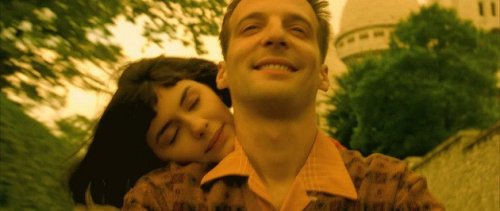Amélie, a Movie for Dreamers


Written and verified by the film critic Leah Padalino
Since its premiere in 2001, Amélie has been on the rise as an icon of French cinema. It’s sort of a myth in the French capital. In fact, fans of the film go there year after year in order to see the film locations.
Jean-Pierre Jeunet gave the world a truly unusual romantic comedy. It’s charming and has an unmistakable personality overall. Who can forget the soundtrack by Yann Tiersen? Or the garden gnomes, the Saint-Martin canal, and the café where Amélie works? They’re all memorable to the audience.
Amélie is an endearing and bizarre character who stole everyone’s heart at the beginning of the millennium. A character who, as the promotional posters for the film point out, is there to change people’s lives.
The beauty of the photography and attention to detail welcome you to a modern fairy tale. Every day seems magical in it. The strange and the common merrily merge. Above all, there lies a somewhat peculiar yet captivating love story. Amélie is creative and original, so the film set a precedent.
A lonely childhood
As it usually happens in stories and in the most archetypal construction of the hero, Amélie is presented from the beginning. That is from her childhood. In fact, viewers get to watch a rather dark past and a lonely childhood, although with comic overtones, just as it happens with most heroes. Thus, Jeunet introduces the heroine as the only daughter of a married couple that didn’t pay attention to her.
Likewise, there’s an omniscient narrator. Therefore, a voice that knows the lives of the characters well and invites you to discover them through their peculiarities.
This narrator guides the viewer through a girl’s lonely childhood. She’s forced to stay home due to a misdiagnosis. Then, she loses her mother tragically. In the face of so much sadness, little Amélie takes refuge in a peculiar imaginary world.
This presentation helps understand the adult Amélie a little better. She’s a young woman who, despite living in Paris and working as a waitress, maintains her characteristic childhood traits. Amélie is introverted and extraordinarily dreamy and her life changes when she listens to the news of Lady Di’s tragic accident.
This news is there as a form of irony to present how Amélie, to her amazement, finds a child’s treasure in her Montmartre apartment.
The finding inspires lonely Amélie’s ultimate goal: to help others. In her quest to find the owner of the metal box hidden for 40 years in her apartment, she discovers that the best way to find happiness is to improve the lives of those around her.
The presence of love
Amélie isn’t only about altruism but also about love. In this sense, the viewer can see it in different directions. One of the main questions that came to mind before watching the film again was how it survived the passage of time. Many stories aren’t that timeless.
Thus, Amélie, like many of the romantic comedies of the early 2000s, is precisely about showing an absolutely mythical idea of romantic love. An idealization that continues to be present in cinema. In fact, one could say that this industry has contributed enormously to creating an image that fuels many fantasies.
The central appearance of love is found in Amélie’s connection with Nino, a young man she casually meets. The audience gradually discovers more information about him. Her love for him is a sort of fantasy that’s sort of like a fairy tale.
One could scold her for this irrational infatuation and even see in her a character who’s rather disturbing if you think about it. However, you’ll ignore these details and get carried away by the magic of her story.
After all, Amélie is a film with a lot of charm and detail. In short, even if the romantic love story isn’t real, it’s best to enjoy it. Thus, forget about the current context and understand it for what it is: a modern fairy tale.
Joseph
However, there is a story you can question. It’s about Joseph’s character when he becomes obsessed with one of Amélie’s coworkers.
The film makes him seem like a stalker and Amélie, in order to help her friend, takes it upon herself to seek revenge. But it isn’t an act of bad revenge, instead, she conspires to bring them together. The problem resolves humorously and, although times have changed, the film is as enjoyable as it was when it first premiered.
In addition to these stories in which love makes an appearance, Amélie soon realizes that no love is more important than her own. In this sense, the protagonist becomes aware that her desire to help others is meaningless if she doesn’t help herself. This may just be the greatest act of love you’ll see in the film.

Amélie, a carefully planned stage
In Amélie, everything seems sweet but the young woman doesn’t hesitate to exercise her strength when necessary. Behind that shy smile, there’s a young woman who, in the face of injustice, will act in a vengeful and even childish way. Don’t forget that Amélie is a dreamer who seems to live a fantasy world. She’s a young woman who’s deeply in touch with her inner child.
All this is reflected in its staging, as noted in the first lines. The soundtrack is key to this fantasy. It’s as if you were seeing it through her eyes. There’s a feeling of being before something magical and imaginary, despite the fact that it takes place in the real world, in Paris.
The use of color, decor, and even the costumes reveal details of this entire framework. You can predict the personality of each one of them by looking at their homes, clothes, and gestures. The photography is well done and the resulting images are truly beautiful.
As you can see, the film is an atypical romantic comedy. Its protagonist lives her fantasy and helps others without them seeing her. The setting is key to understanding this whole world dreamed by Amélie. Also, the narrator’s voice appears during key moments to reveal certain peculiarities of the characters.
Final notes on Amélie
Amélie became a hit because it’s absolutely creative and original. In fact, it’s the second-highest-grossing French film, surpassed only by The Intouchables (Nakache, 2011). Likewise, it won almost every award at the 27e cérémonie des César (27th César awards), obtained two BAFTAs, and, also, several Academy Award nominations.
This is one of the best romantic comedies with fantasy overtones, no doubt. It’s one of the most popular French films in history. Amélie conquered the audience due to her sweetness but also due to her revenge. In some way, it fulfilled what the posters said about it by changing some lives. This is because it invites the audience to look at the world from a different perspective.
Since its premiere in 2001, Amélie has been on the rise as an icon of French cinema. It’s sort of a myth in the French capital. In fact, fans of the film go there year after year in order to see the film locations.
Jean-Pierre Jeunet gave the world a truly unusual romantic comedy. It’s charming and has an unmistakable personality overall. Who can forget the soundtrack by Yann Tiersen? Or the garden gnomes, the Saint-Martin canal, and the café where Amélie works? They’re all memorable to the audience.
Amélie is an endearing and bizarre character who stole everyone’s heart at the beginning of the millennium. A character who, as the promotional posters for the film point out, is there to change people’s lives.
The beauty of the photography and attention to detail welcome you to a modern fairy tale. Every day seems magical in it. The strange and the common merrily merge. Above all, there lies a somewhat peculiar yet captivating love story. Amélie is creative and original, so the film set a precedent.
A lonely childhood
As it usually happens in stories and in the most archetypal construction of the hero, Amélie is presented from the beginning. That is from her childhood. In fact, viewers get to watch a rather dark past and a lonely childhood, although with comic overtones, just as it happens with most heroes. Thus, Jeunet introduces the heroine as the only daughter of a married couple that didn’t pay attention to her.
Likewise, there’s an omniscient narrator. Therefore, a voice that knows the lives of the characters well and invites you to discover them through their peculiarities.
This narrator guides the viewer through a girl’s lonely childhood. She’s forced to stay home due to a misdiagnosis. Then, she loses her mother tragically. In the face of so much sadness, little Amélie takes refuge in a peculiar imaginary world.
This presentation helps understand the adult Amélie a little better. She’s a young woman who, despite living in Paris and working as a waitress, maintains her characteristic childhood traits. Amélie is introverted and extraordinarily dreamy and her life changes when she listens to the news of Lady Di’s tragic accident.
This news is there as a form of irony to present how Amélie, to her amazement, finds a child’s treasure in her Montmartre apartment.
The finding inspires lonely Amélie’s ultimate goal: to help others. In her quest to find the owner of the metal box hidden for 40 years in her apartment, she discovers that the best way to find happiness is to improve the lives of those around her.
The presence of love
Amélie isn’t only about altruism but also about love. In this sense, the viewer can see it in different directions. One of the main questions that came to mind before watching the film again was how it survived the passage of time. Many stories aren’t that timeless.
Thus, Amélie, like many of the romantic comedies of the early 2000s, is precisely about showing an absolutely mythical idea of romantic love. An idealization that continues to be present in cinema. In fact, one could say that this industry has contributed enormously to creating an image that fuels many fantasies.
The central appearance of love is found in Amélie’s connection with Nino, a young man she casually meets. The audience gradually discovers more information about him. Her love for him is a sort of fantasy that’s sort of like a fairy tale.
One could scold her for this irrational infatuation and even see in her a character who’s rather disturbing if you think about it. However, you’ll ignore these details and get carried away by the magic of her story.
After all, Amélie is a film with a lot of charm and detail. In short, even if the romantic love story isn’t real, it’s best to enjoy it. Thus, forget about the current context and understand it for what it is: a modern fairy tale.
Joseph
However, there is a story you can question. It’s about Joseph’s character when he becomes obsessed with one of Amélie’s coworkers.
The film makes him seem like a stalker and Amélie, in order to help her friend, takes it upon herself to seek revenge. But it isn’t an act of bad revenge, instead, she conspires to bring them together. The problem resolves humorously and, although times have changed, the film is as enjoyable as it was when it first premiered.
In addition to these stories in which love makes an appearance, Amélie soon realizes that no love is more important than her own. In this sense, the protagonist becomes aware that her desire to help others is meaningless if she doesn’t help herself. This may just be the greatest act of love you’ll see in the film.

Amélie, a carefully planned stage
In Amélie, everything seems sweet but the young woman doesn’t hesitate to exercise her strength when necessary. Behind that shy smile, there’s a young woman who, in the face of injustice, will act in a vengeful and even childish way. Don’t forget that Amélie is a dreamer who seems to live a fantasy world. She’s a young woman who’s deeply in touch with her inner child.
All this is reflected in its staging, as noted in the first lines. The soundtrack is key to this fantasy. It’s as if you were seeing it through her eyes. There’s a feeling of being before something magical and imaginary, despite the fact that it takes place in the real world, in Paris.
The use of color, decor, and even the costumes reveal details of this entire framework. You can predict the personality of each one of them by looking at their homes, clothes, and gestures. The photography is well done and the resulting images are truly beautiful.
As you can see, the film is an atypical romantic comedy. Its protagonist lives her fantasy and helps others without them seeing her. The setting is key to understanding this whole world dreamed by Amélie. Also, the narrator’s voice appears during key moments to reveal certain peculiarities of the characters.
Final notes on Amélie
Amélie became a hit because it’s absolutely creative and original. In fact, it’s the second-highest-grossing French film, surpassed only by The Intouchables (Nakache, 2011). Likewise, it won almost every award at the 27e cérémonie des César (27th César awards), obtained two BAFTAs, and, also, several Academy Award nominations.
This is one of the best romantic comedies with fantasy overtones, no doubt. It’s one of the most popular French films in history. Amélie conquered the audience due to her sweetness but also due to her revenge. In some way, it fulfilled what the posters said about it by changing some lives. This is because it invites the audience to look at the world from a different perspective.
All cited sources were thoroughly reviewed by our team to ensure their quality, reliability, currency, and validity. The bibliography of this article was considered reliable and of academic or scientific accuracy.
- Andrew, D. (2004). Amélie, or le fabuleux destin du cinema Francais. Film Quarterly, 57(3), 34-46. https://online.ucpress.edu/fq/article-abstract/57/3/34/41607/Amelie-or-Le-Fabuleux-Destin-du-Cinema-Francais
- Bonnaud, F. (2001). The Amélie Effect. Film Comment, 37(6), 36. https://www.proquest.com/openview/bdac2f162a6384a28d0bd5ddc5909245/1?pq-origsite=gscholar&cbl=24820
- Durham, C. A. (2008). Finding France on Film: Chocolat, Amélie and Le Divorce. French Cultural Studies, 19(2), 173-197. https://journals.sagepub.com/doi/abs/10.1177/0957155808089664
- Jean-Pierre, J. (2001). Le Fabuleux destin d’Amélie Poulain [película]. Claudie Ossard Productions.
- Scatton, M. (2004). Le Petisme: Flirting with the Sordid in Le Fabuleux Destin d’Amélie Poulain. Studies in French Cinema, 4(3), 197-208. https://www.tandfonline.com/doi/abs/10.1386/sfci.4.3.197/0?journalCode=rsfc20
- Vicente, M. T. (2013). Tras los pasos de Amélie: de Montmartre al resto de París. Arte y Ciudad – Revista de Investigación, 3, 117-151. https://arteyciudad.com/revista/index.php/num1/article/view/92
- Vanderschelden, I. (2007). Amélie: French Film Guide. Bloomsbury Publishing.
This text is provided for informational purposes only and does not replace consultation with a professional. If in doubt, consult your specialist.







